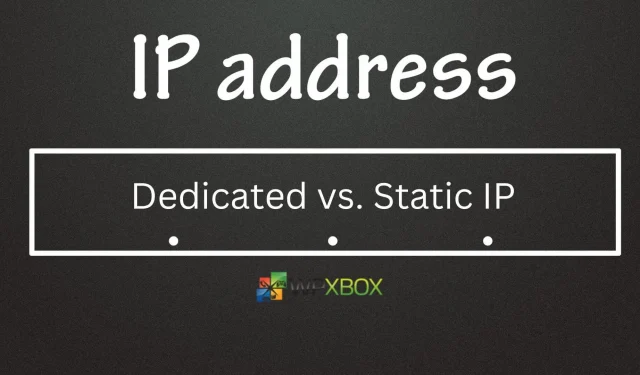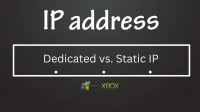If you are a serious Internet user, chances are you have heard of IP addresses and know how they work. But you may not know about the different types of IP addresses or which one is best for your purposes. In this article, we will look at the differences between dedicated and static IP addresses and help you understand when to use them. But let’s start by defining IP addresses.
What is an IP address?
IP addresses are unique identifiers for devices connected to a local area network or the Internet. Usually consisting of four numbers separated by dots, an IP address allows computer systems or devices to communicate with each other. Every time a computer connects to a network, it is identified by its IP address, just like we identify each other by name.
There are four types of IP addresses: public, private, static, and dynamic. This article will focus on one of these typologies: static IP.
What is a static IP address?
A static IP address is a type of IP address that does not change over time. It is in stark contrast to dynamic IP addresses, which often change over time. Static addresses are especially useful in the following situations.
- You own and maintain a web server that users can connect to over the Internet.
- You want to allow external devices or services to connect to your network through an IP address, not a name.
- You have established a remote connection to your company computers via VPN.
What is a dedicated IP address?
A dedicated IP address is a static IP address intended for use only by the assignee. You can think of it as an individual IP option that gives you exclusive access to a dedicated server. Thus, instead of sharing the address with other users, you use it alone.
Since a dedicated IP address allows you to track your online footprints, it is better suited for people who want to make highly secure online transactions, such as making payments. However, it still keeps your online traffic private and invisible.
What is the difference between a dedicated and static IP address?
Although some people use the terms “dedicated IP address”and “static IP address”interchangeably, there are several differences between the two, including the following:
exclusivity
Exclusivity is the most significant difference between dedicated and static IP addresses. A website with a dedicated IP address on a shared web server exclusively uses that address. No other device or website can use this address. On the contrary, a static IP address can be shared among different users, which means that many users can use this address to access the network.
Trust level
Some websites are more likely to blacklist a shared IP than a dedicated IP. It is difficult to trace the activities of each user on a shared IP address, which poses a security risk. Since a dedicated IP address is assigned to only one account, it is easier to trust because the user’s activities can be tracked. This measurement of trust also works in local networks. If users on the company network are assigned dedicated IP addresses, it will be easier to monitor each user’s activity and ensure that they comply with procedures.
Authentication
If you’re a regular Internet user, you’ve probably already had to authenticate with a captcha. Disappointing, right? This is because you were on a shared IP address. As explained in the previous paragraph, when a web server receives multiple requests from the same IP address, it flags them. And that is why you sometimes have to pass a captcha check. With a dedicated IP address, your footprints are kept clean and you can avoid the authentication process entirely. You can also easily make online payments.
What type of IP should be used?
As you may have gathered from the previous one, it is almost impossible to recommend an IP right away. But you can consider the following factors when choosing between static and dedicated IP addresses:
Availability
Dedicated IP addresses are more expensive than shared IP addresses. Thus, you should consider your budget when choosing between them. However, if you have an active VPN subscription, you can get a dedicated IP address for an additional fee if your provider offers this service.
Target
Here we will distinguish between personal and business goals. As someone who wants to connect to the internet securely, a static IP may be enough for you if you don’t make payments in the process. Businesses are better off using dedicated IPs because of the added benefits of traceability and security, among other things.
FAQ
Is a dedicated IP the same as a static IP?
Dedicated and static IP addresses are the same to the extent that they do not change over time. However, they differ in that a dedicated IP address can only be used by a designated person, while many users often use a static IP address. Also, static IPs are usually free, unlike dedicated IPs, which you have to pay for.
Is a dedicated IP worth it?
A dedicated IP address provides enhanced security, increased site speed, and zero chances of getting banned unless you break the rules. If any of this means anything to you, then the investment is worth it.
When should you use a static IP address?
If you need reliable access to devices on your network, purchasing a static IP address is the best option as it ensures that shared devices can be easily found on the network.


